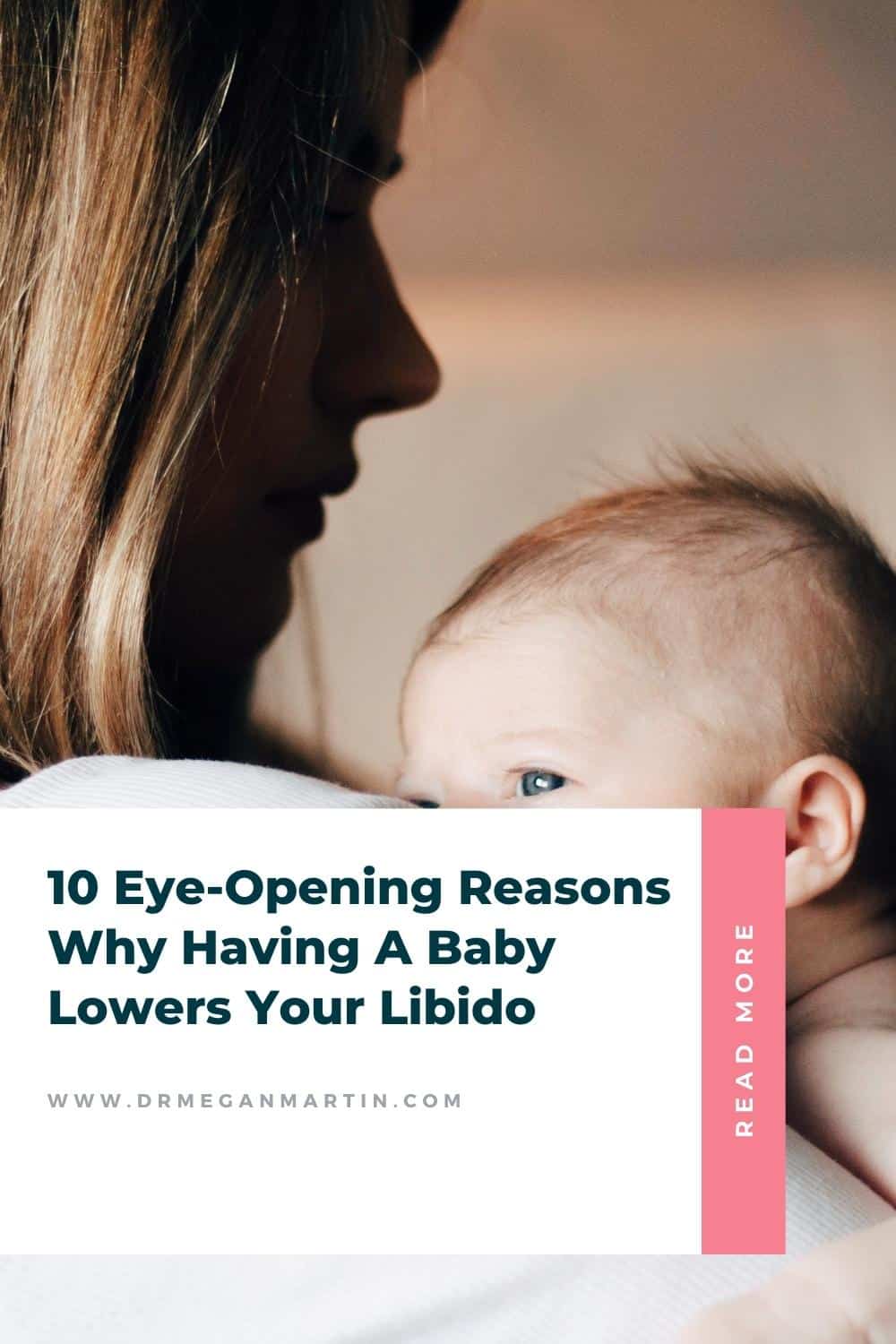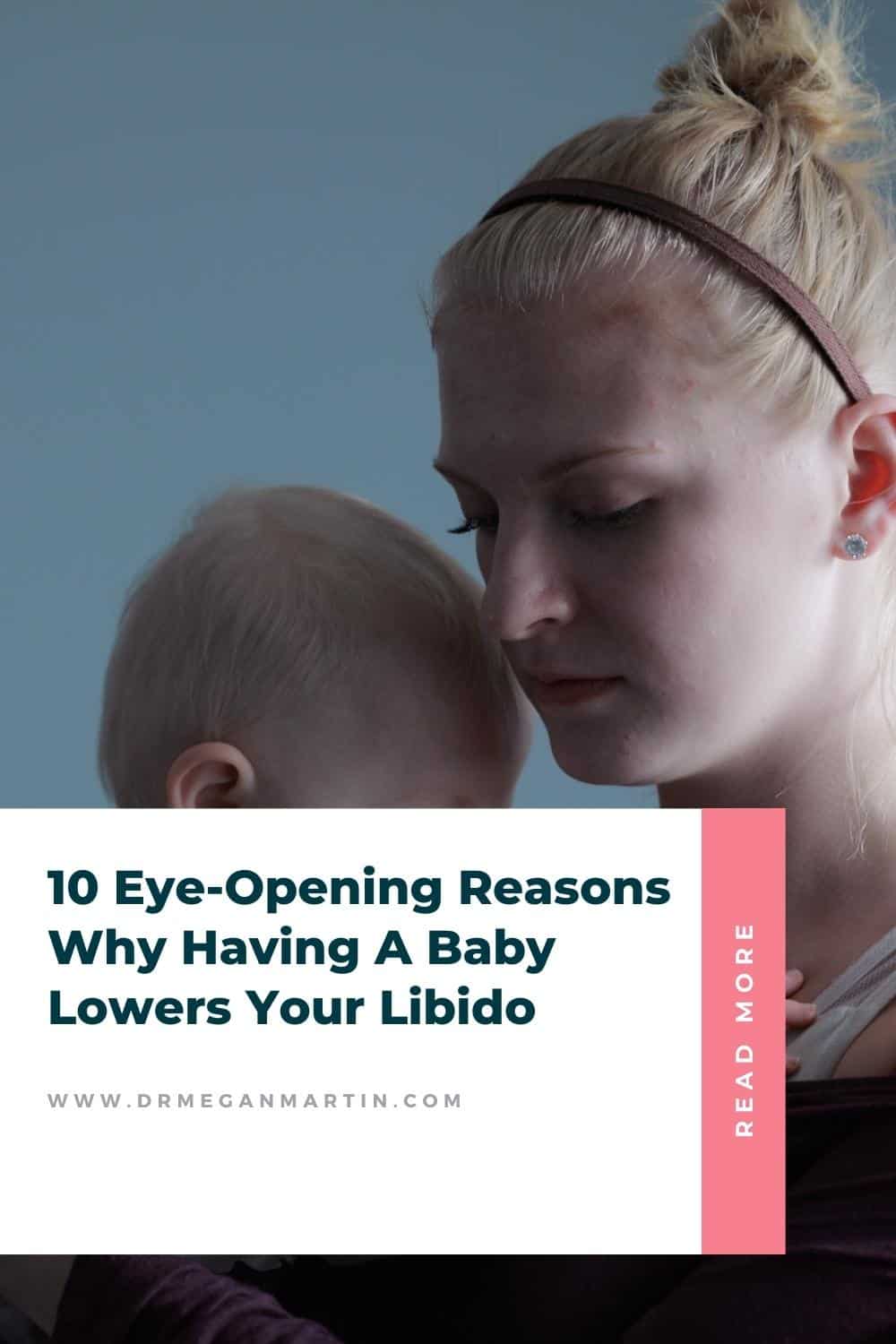Have you ever wondered why having a baby lowers your libido or why your sex life seemingly disappeared overnight after the baby came along?
You aren’t alone! Babies change everything, including your interest in sex.
Growing and carrying a human inside you for 9 months, giving birth to them, breastfeeding them and taking care of them 24 hours a day is no small task! So it’s totally understandable that you (and your body) need a lot of time to rest and recover afterwards. You’ve been through the most!
So before we jump into the specifics of why having a baby lowers your libido, let’s just take a moment to appreciate all that you’ve just gone through: physically, mentally and emotionally. Whether your delivery went smoothly, or it was difficult or traumatic, it’s totally normal that you would need time to recover. It’s totally normal that you wouldn’t be interested in having sex as much as you did before the baby came along.
Toss that guilt and shame out the door because what you’ve been through and what you’re going through right now is far more important than sex! You do not have to be “ready” at that arbitrary “doctor-recommended” 6 week mark. At 6 weeks postpartum your wounds may have healed, but you’re still only in the beginning stages of recovery. You still have a long way to go!
During this time, it’s okay that sex isn’t at the top of your priority list. What you’re feeling or experiencing right now is real, valid and reasonable.
Still need convincing?

Here are 10 reasons why having a baby lowers your libido:
1. After birth, there is a sharp drop in your oestrogen and progesterone levels.
Oestrogen is the hormone that helps with vaginal lubrication and arousal, so a drop in oestrogen will make it more difficult to get aroused or be sufficiently lubricated. Oestrogen also plays a role in the production of serotonin, so lower oestrogen levels will predispose you to depression or anxiety.
The huge drop in progesterone is also thought to play a major role in postpartum depression, which can last for quite a while because your ovaries won’t start producing progesterone again until your next menstrual cycle.
2. Breastfeeding causes a sharp rise in your prolactin levels.
Prolactin is the hormone that stimulates milk production and it can further reduce your oestrogen levels.
This hormone also inhibits your sexual excitation system in your brain, so you’re less aware of sexual cues and it takes more time and effort to turn you on. If your sexual excitation system isn’t strong or sensitive, sex can fall off your radar.
3. Your brain is flooded with oxytocin.
Oxytocin is commonly known as the cuddle hormone. This hormone promotes infant bonding and makes us more interested in snuggling our newborn than seeking out sex.
Oxytocin is commonly known as the cuddle hormone. This hormone promotes infant bonding and makes us more interested in snuggling our newborn than seeking out sex. Share on XFor some people, the increased prolactin levels combined with the raised oxytocin levels can make you find great pleasure in breastfeeding, which may become your primary way of meeting your emotional and physical intimacy needs during this time. So you’re less interested in sex or you don’t need as much physical affection from your partner.
For others, it can have the opposite effect. All of the cuddly hormones and sensual touching may make it easier for you to get aroused and increase your desire for sex. Breasts are an erogenous zone for many people after all!
Breastfeeding can be a sensual (or even erotic) experience for many people and help them feel present in their bodies, but that doesn’t mean that it’s a sexual experience – there’s a difference!
As an aside: If you have experienced involuntary arousal when breastfeeding, you’re not alone! It’s normal and even pretty common. It’s your body’s natural physiological response to all of that oxytocin combined with nipple stimulation. And while it can feel confusing, it’s not something to worry about or feel ashamed of, and it doesn’t mean that you’re turned on by nursing your baby.
4. You’re feeling too “touched out”.
Feeling “touched out” is when a parent feels irritable or overwhelmed after being constantly touched by their babies or young children. After spending so much time in physical contact with other people, providing affection and care, the thought of receiving any more touch from others can make them extremely uncomfortable. They may start to recoil or move away when somebody tries to touch them – even their partners.
For example: If you’ve spent the whole day in close contact with your child, with them hanging on you, constantly demanding your attention and affection, when your partner comes home, it’s likely that the last thing you’ll want is more physical touch. You may try to avoid hugs and kisses from them as much as possible, and sex may be taken off the table completely. This is totally normal.
It's normal to crave alone time or need some space, it doesn't make you a bad parent. And it doesn't mean you don't love your partner. Share on XIt’s normal to crave alone time or need some space, it doesn’t make you a bad parent. And it doesn’t mean you don’t love your partner. You can’t be everything for everyone all the time, so it’s normal that your sex life would take a back seat during this time. Don’t be so hard on yourself. This phase won’t last forever and you will get through it. You will enjoy touch again!
5. You’re exhausted and not getting enough sleep.
New parents are exhausted. And exhausted people don’t want to have sex. Taking care of young children, especially those who don’t sleep through the night, is hard work!
You’re probably physically and mentally exhausted right now, you aren’t getting enough sleep, your body is still recovering, and maybe your partner isn’t pulling their weight. You have all the reasons in the world to not be interested in sex!
Stress, sleep deprivation and fatigue hit your sexual brakes and inhibit your sexual responses, making you less likely to desire sex, get aroused or even have an orgasm.
Stress, sleep deprivation and fatigue hit your sexual brakes and inhibit your sexual responses, making you less likely to desire sex, get aroused or even have an orgasm. Share on X6. You prioritise everyone else’s needs before your own.
If you’re too busy taking care of your new baby (and partner), and making sure that they’re happy, you may not have the time or energy to take care of yourself. And if you aren’t taking care of yourself, both physically and emotionally, it’s highly unlikely that you’ll be interested in sex. There may be too many things hitting your brakes and not enough things pushing on your sexual accelerators to get you in the mood.
It’s possible that you may even feel like you’ve lost your identity in becoming a parent and spouse. That’s why it’s so important to carve out time and space for yourself, to rest, but also to do things that bring you joy.
7. You’re struggling with body image issues.
Worrying about your appearance can reduce your desire for sex, interfere with your arousal, and even reduce your pleasure or ability to orgasm during sex because you’re so distracted by what you think you look like.
Worrying about your appearance can reduce your desire for sex, interfere with your arousal, and even reduce your pleasure or ability to orgasm during sex because you're so distracted by what you think you look like. Share on XIt’s no secret that pregnancy and childbirth can change your body in many ways, and that your body may never return to the way it was before you got pregnant. Maybe you’ve gained some weight, or you have saggy skin or stretchmarks you didn’t have before. Maybe your breasts look different or you hate your episiotomy/caesarean scar. Whatever it is, things have changed, but that doesn’t have to be a bad thing.
You just grew a whole baby and brought it into the world. It’s totally normal to need time to adjust to the way your new body looks and feels. Sex will probably look and feel different for you as well, and that’s okay! Learning to feel comfortable in your new body isn’t going to happen overnight.
It’s so important for me to emphasise that your body is not a problem that needs “fixing”. These body changes do not determine your worth. You are enough just the way you are, just like you always have been. And you’re so much more than a number on a scale!
Your body is not a problem that needs "fixing". Share on X8. You’re full of stress and anxiety.
Being a new parent and having to take care of a little human who seems hell-bent on putting themselves in danger is a recipe for major stress and anxiety. There are so many new things to learn and keep track of when a new baby joins the family, and if you’re also having to juggling work responsibilities and taking care of the home, well, it would make more than enough sense that you would feel overwhelmed!
Unfortunately, stress is a libido’s biggest enemy. It activates our fight-or-flight response and can completely evaporate our desire for sex. Thinking about sex or getting aroused can be incredibly difficult (if not impossible) when your main focus is on surviving and making it through the day.
Thinking about sex or getting aroused can be incredibly difficult (if not impossible) when your main focus is on surviving and making it through the day. Share on X9. You’re struggling with birth-related complications.
Childbirth is no walk in the park, in fact, it may be the hardest thing you ever have to go through. It can take a huge toll on your body and even lead to further complications, like incontinence, pelvic organ prolapse, episiotomy wounds/scars, painful sex, etc.
If you’re experiencing pain during sex, it would make sense that you would avoid having sex as much as you can. If you’re struggling with incontinence or prolapse, it would make sense that you would avoid having sex because you’re worried about leaking or feel uncomfortable with how you look, feel or smell.
The good news is that you don’t have to continue struggling with these problems (and you shouldn’t!). All of these problems are treatable and help is available.
If this is something that you’re currently struggling with, please see your local GP/Gynaecologist/Sexual Health Practitioner to get the help you need.
10. You’re struggling with birth trauma.
385 000 people give birth around the world every day, but that doesn’t mean that it’s easy or no big deal!
385 000 people give birth around the world every day, but that doesn't mean that it's easy or no big deal! Share on XIt’s still a traumatic event. Inadequate pain relief, surgery, infections, bleeding, poor treatment by healthcare providers, or even the fear of something going wrong for you or the baby can take a huge toll on your physical and mental health.
It can affect how you think about your body and how it functions, or completely change your relationship with your genitals, or how you feel about sex.
Childbirth is traumatic and can have long-lasting effects even when everything goes right, so it’s okay if you need time to heal and recover before jumping back into having sex.
It’s not your fault.
If you can relate to one (or all 10) of these reasons, it makes complete sense why you haven’t been as interested in sex as you used to be. I hope that you can see that now too, and it takes some of the pressure off. You already have more than enough on your plate!
Having a lower libido is a normal part of this new life stage, and it’s not something you need to panic about. With time, care and attention, your sex life can be re-established, and you can have a thriving sexual connection with your partner.
If you’ve been struggling with this for a while and need help rebuilding your sexual connection from scratch, then Libido Academy is exactly what you need. You’ll learn how to improve your libido, manage the differences in libido in your relationship, and create a nourishing, thriving sexual connection where sex is fun, intimate and something to look forward to again (for both of you!). It’s a real game-changer! Check it out HERE.
Can you think of any more reasons why having a baby lowers your libido?






0 Comments